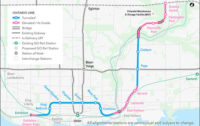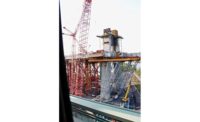A private consortium of engineering and construction firms won more than $177 million in extra payments to keep its nearly $4-billion Toronto light-rail project on track, despite having agreed to shoulder cost overruns, according to an Ontario auditor's report released earlier this month.
Metrolinx, the provincial agency overseeing the Eglinton Crosstown transit project, paid building consortium Crosslinx Transit Solutions that sum to ensure it would meet the project’s 2021 completion deadline, said Ontario Auditor-General Bonnie Lysyk.
The consortium had encountered a number of delays that threatened to upend the schedule of the19-kilometer light rail project, which is half below ground and includes 25 new stations.
Lysek's report is the first public disclosure of the financial terms reached in the August settlement of a 15-month dispute between Metrolinx and Crosslinx Transit Solutions over the project schedule, according to Canadian construction publication OnSite
The audit report said payments to the consortium—made up of ACS-Dragados, Aecon Group, EllisDon and SNC-Lavalin—highlight issues with the project's alternative financing and procurement (AFP) contracting approach, in which the private sector partners are supposed to shoulder overrun risks in exchange for an upfront premium.
Disputed Details
Lysyk faulted Metrolinx for paying out the $177 million without having “sufficient documentation” of the consortium’s claim that the transit authority was partly to blame for delays.
She contended that Metrolinx technical advisers partly blame the delays on the consortium, noting both late submission of designs and their "poor quality.” Design problems include tunnels with no provisions for signaling and fire detection equipment.
The consortium built parts of the project before the design was officially approved, raising the risk of “unplanned and less-than-optimal modifications" if the completed work is not in compliance with the AFP contract, the auditor-general said.
The report also suggested the contract, inked in July 2015, may not give Metrolinx enough leverage to hold the consortium responsible for delays and other performance issues.
While the team must lay out a six-month-ahead work plan, with monthly updates, and Metrolinx is authorized to seek added detail for an in-depth schedule analysis, the transit agency could only move ahead on that review if the consortium acknowledged it might not meet the project completion date.
Metrolinx also could request the information if it felt the consortium had fallen “significantly” behind schedule. But it opted not to do so, since builders insisted project completion would be on time, current delays notwithstanding.
The consortium started falling behind in 2017, during the year, submitting work schedules with increasing delays, even as it insisted it would meet the final deadline, the audit report noted.
Metrolinx relayed its delay concerns, but the consortium “failed to adequately address them,” said the audit. The agency was apparently unable to probe deeper given builders' insistence they were still on track to deliver the project in 2021.
While the consortium promised to unveil solutions in early 2018 to deal with the mounting delays, instead it filed a claim to extend Crosstown’s completion date by more than a year to October 2022.
Finding Remedies
“The AFP contract with the consortium does not provide Metrolinx with adequate remedies to address project delays that it knows of early in the project,” the auditor-general said in her report.
The extension request ultimately led to the $177-million settlement and consortium re-commitment to the project’s 2021 completion.
Under that pact, about $75 million of the payment is contingent on Crosstown opening in September 2021, the transit agency said in a statement, adding that the settlement "was a very positive resolution of complex construction risks on this project" [and] " was achieved at less than half the value of the real risk Metrolinx was exposed to."
The agency told the Canadian construction publication that, on future projects it will work with the province “to review specific contractual terms to strengthen the remedies available in the case of delays, claims and disputes.”
Consortium comment could not be obtained at ENR deadllne.
Barbara Thomson, chairperson of local activist group Scarborough Transit Action, is skeptical if the contract truly shifts risk from the public sector and taxpayers.
“These are very, very complex projects and from my understanding, if you don’t have your designs ready in a timely manner, that is a risk you as a private company take; you have to take responsibility,” she said. “We don’t want to see the government pay any more than they should.”
Echoing the added complexities of P3 contracting on transit jobs, Matti Siemiatycki, an urban planning expert at the University of Toronto, said that “risk transferred on paper is not necessarily risk transferred in reality."





